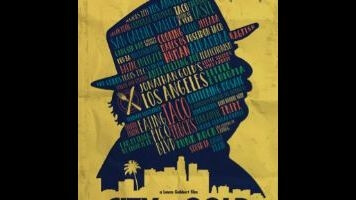The documentary City Of Gold is a love letter to food—and Los Angeles

Thanks (or no thanks) to movies and television, Los Angeles has a reputation as a town full of vapid, Hollywood-bound New Agers, who distrust art, value money, and consume all their meals in smoothie form. But since the mid-1980s, critic Jonathan Gold has been exploring a very different L.A., found among the mini-mall ethnic restaurants and vendor-trucks in less ritzy neighborhoods. Inspired by humorist Calvin Trillin—who always said that he’d rather eat where locals go after they get home from a long trip than the place where they take their visiting parents—Gold’s spent the past few decades writing about the cheap local delis and diners that define an alternate Los Angeles. He won a Pulitzer Prize for capturing the part of his city that shows up sometimes in detective novels, but rarely on any big or small screen.
Laura Gabbert’s documentary City Of Gold takes something of a once-over-lightly approach to Gold’s life, sprinkling little bits of his biography throughout: his upbringing in an family of activists and intellectuals; his second career as a writer about punk, rap, and classical music; his devotion to his artsy wife and kids; and his difficulty meeting deadlines. But this isn’t really a bio-doc. And though Gabbert includes scenes of Gold dining out—and scenes of him meeting with his sometimes-frustrated editors—City Of Gold isn’t a fly-on-the-wall/slice-of-life either. The film has something else in mind, keyed to the “city” part of its title.
City Of Gold takes its cues from influential British architecture critic Reyner Banham, whose 1971 book Los Angeles: The Architecture Of Four Ecologies persuaded social commentators that the city’s not just a random, unplanned assortment of suburbs and freeways. As Gold puts it, “There really is a thereness beneath the thereness.” There are distinct enclaves that have built up over time, as various immigrant groups have settled into the cheap land between where the rich folks live. Neither Gold nor this documentary is especially interested in young chefs selling an “artisanal” “interpretation” of something authentic. City Of Gold is more about cuisines and communities that have long been quietly cemented into the L.A. landscape.
So Gabbert rides along with Gold as he waxes rhapsodic about the long roads that wind through different neighborhoods, past recently slapped-together pupusa stands and greasy old joints with outstanding chili fries. Gold has covered Los Angeles’ street-food scene long enough to consider a new spicy tostada to be scoop-worthy, and to be able to identify Mexican food by region. He eats at places where the proprietors learned to cook from their grandmas, and where people hold titles like “cook/waiter.” And with one glowing review, he can assure that these restaurateurs’ kids will be able to afford to go to college.
City Of Gold is a little too scattered—and not in a way that suggests Gabbert is trying to emulate L.A. sprawl. Brief talking-head testimonials from celebrity chefs like David Chang and Andrew Zimmern include some good points (especially the latter, who says that Gold avoids the all-too-common cultural sin of “contempt prior to investigation”). But they also feel like unnecessary concession to conventionality. And the movie doesn’t need that, when it has the articulate, passionate, decidedly unglamorous Gold representing his Los Angeles. As Gabbert alternates his monologues with long, gliding shots of funky supermarkets and old cinemas, she makes the point these aren’t disconnected aberrations in L.A. This is the city.